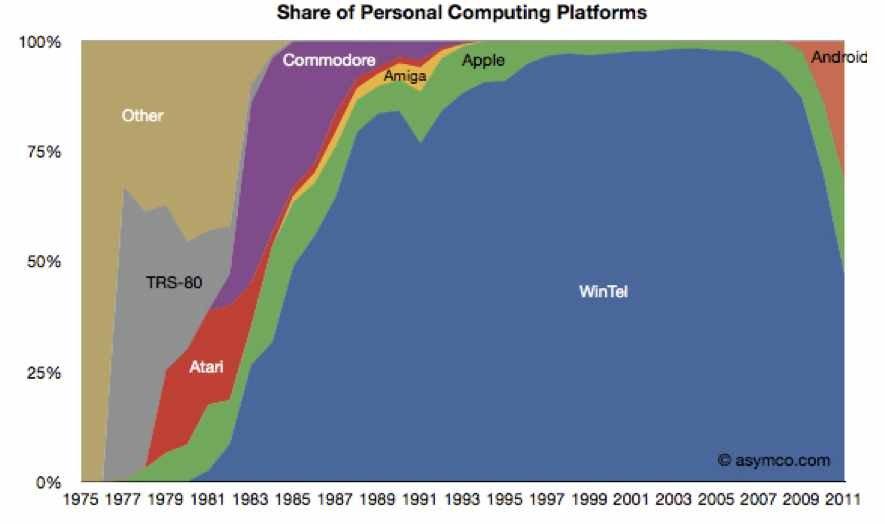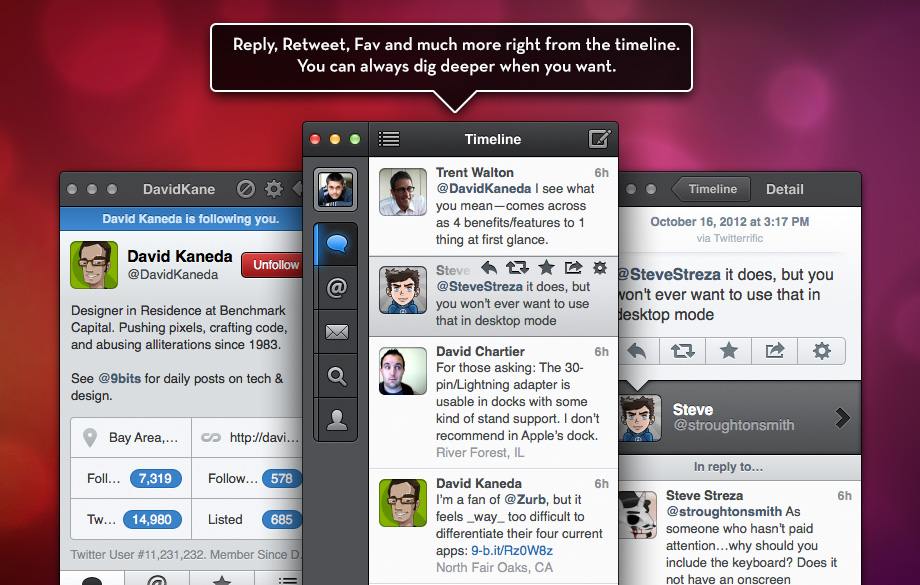Windows, as a consumer product, is a burning platform. Innovation has stopped. Or isn’t in the right direction.
This chart says it all:

Yes, it’s relative share (a smaller part of a bigger pie) but PC growth has stagnated. Microsoft makes a significant bulk of its Windows revenue from new PC sales and business upgrades – very few consumers actually upgrade their Windows absent a new computer. Back in the 90’s technology moved so quickly that a computer released in 1998 had technology not even heard of in 1996. You’d be a fool not to upgrade! Nowadays? Not so much.
Why? Because Microsoft has no taste. And more importantly, neither do most Windows software developers. Open up virtually any popular Windows application and you’re presented with a really ugly interface:

Boring grids, lackluster UX and visual design, indecipherable “help wizards”.
iOS and OSX app developers have a strong design aesthetic. OSX apps look nice:


Web developers share the same design-as-a-core-competency philosophy influenced by Apple:
And developers are on the same OSX bandwagon. At virtually every innovative conference and meetup I attend, ranging from JavaScript to Ruby to the Business of Software conference, I’m met with a sea of glowing Apple logos on MacBook Airs and Pros (or the subdued Apple logo on iPads).
Yes, if you go to a .NET conference or perhaps a big-enterprise conference, you’ll likely see a lot more Windows machines in the audience. But the “get ‘em young” strategy is likely to work well for Apple, as future developers starting with OSX and Apple are significantly more likely to continue with the platform as they enter the workforce, demanding OSX development environments or not working at predominantly Windows shops.
Microsoft realized this years ago but only recently has there been a flip-flop on the younger generation as new college students prefer Mac to PC.

This is a trend that is likely to continue as long as Windows clone manufacturers continue to underperform against Apple. And, without the halo effect of a strong phone and tablet, Microsoft has no hope of luring consumers back to the Windows ecosystem.
Because Microsoft has no taste neither do their developers, and so there’s nothing in the Windows ecosystem that is desirable:

Today’s children are tomorrow’s consumers (and business owners!) and they are overwhelmingly rejecting Microsoft’s (non-Xbox) offerings in favor of Apple (and to a lesser extent, Android).
But what about businesses? Microsoft has long held a lock on large enterprises that require strong controls and IT departments. Apple has a history of ignoring this market, and there’s no evidence of this changing. However, with the “BYOD” movement, Apple is proving to be a competent player and Microsoft is increasing costs. Enterprise Apple sales are outperforming Windows.
Microsoft also held a lock on the small and medium sized businesses that could setup Windows computers, servers, and services (Exchange, MS Office, etc.). However, SMBs are increasingly replacing expensive locally hosted solutions with cloud based that are cheaper, require significantly less management, and provide better availability and performance.
The loss of developer, youth, and app mindshare is a huge blow to the Windows platform. iOS and Android ecosystems are defined by the apps that run on their devices. And the web is increasingly becoming the way we run applications on our bigger desktop and laptop computers.
Microsoft has billions of dollars in revenue and is not likely to disappear any time soon, but the era of Microsoft as a dominant consumer platform is over. Developers are moving to the web in droves and switching to OSX (or Linux). American youth are preferring Apple and iOS products, and small and medium sized businesses are replacing Microsoft software with web-based apps to manage and run their business.
Software companies that don’t have design as a core, integral component to their software design are at an ever-increasing disadvantage against companies that do.
(Edit: Updated with a more recent image of QuickBooks.)